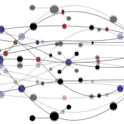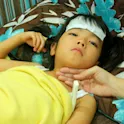Frontiers Communications
Editor
Editor

Life sciences
12 May 2016
By Abigail Pattenden, Frontiers science writer From minor acts of rebellion such as bunking off school, to the more serious experimentation with illicit substances, the teenage years can be a stressful time for parents. But what if your child goes beyond the odd cigarette behind the bike shed or sneaking sherry from the drinks cabinet? Some teenagers develop riskier behavior, such as binge drinking or drug taking, which can follow them into adulthood with all the health concerns that go with them. New research conducted at the University of Sussex has identified a specific gene that links impulsive behavior to binge-drinking in teens. “Our findings are important because we show that certain variations in the KALRN gene are associated both with alcohol binge drinking and with brain activation during impulsive responding in adolescents,” said Dr. Yolanda Peña-Oliver, who led the researchers under the supervision of Professor Dai Stephens. “These results provide a novel insight into the possible neurobiological and genetic determinants of impulsivity and alcohol abuse. Studies like ours will be instrumental in discovering biomarkers that might be used to predict future vulnerability to develop disorders such as ADHD or drug addiction, in which impulsivity is a core symptom.” The […]

Psychology
11 May 2016
By Tania FitzGeorge-Balfour, Frontiers science writer Wide variations can be seen in how far citizens from different countries evade tax. While this can be attributed to how well institutions deter tax avoidance through audits and fines, cultural differences may also play a part. New research, reported in the open-access journal Frontiers in Psychology, suggests that two countries, with contrasting reputations for trustworthiness, can show subtle differences in their compliance for paying taxes. “Our experiments demonstrate that Italians on average are just as honest as Swedes. Interestingly, however, Italians are more likely to ‘fudge’ (cheat a little), whereas if a Swede decides to cheat, he is more likely to go all the way,” says Sven Steinmo, Professor at the Robert Schuman Center for Advanced Study in Florence, Italy, co-author of this study. Participants for this research were recruited from Italy and Sweden. Swedes think that honesty is a typical national trait, whereas the trustworthiness of Italians is ranked as low, not only by other EU countries, but by Italians themselves. The subjects were asked to perform an experimental task that mirrored features of tax systems used by many countries. Currency units earned at the start of the test were reported voluntarily, […]

Neuroscience
11 May 2016
By Abigail Pattenden, Frontiers Science Writer A new discovery could help people suffering with single-sided deafness (SSD) find a treatment quicker – and could potentially lead to a cure. SSD affects around 9,000 people per year in the UK, and around 60,000 per year in the US. It can be caused by a number of things – from viral infections to brain tumours – and is currently incurable and difficult to treat. Symptoms of SSD include impaired hearing, difficulty filtering out background noise, and difficulty determining sound direction. A major stumbling block to finding the best treatment has been the current lack of biomarkers against which to measure a treatment’s efficacy, but Dr Srikantan Nagarajan – a specialty chief editor of Frontiers in Human Neuroscience, along with Dr Steven Cheung, and a group of scientists based at the University of California have been looking at brain plasticity in response to the development of SSD. Their recent discovery could pave the way to the development of such biomarkers, and potentially, a cure. Brain plasticity is the ability of the brain to modify its own structure and function in response to changes within the body (e.g., disease) or external factors. It is […]

Psychology
10 May 2016
A recent study suggests that who we are might be more integrated with where we are than previously thought. Demonstrating how architects and urban planners might take guidance from disciplines like neuroscience, philosophy and psychology, a paper published in Frontiers in Psychology, reveals that a good built environment might promote well-being and effect our decisions. Contrary to the idea that we are separate from what we experience, the study claims that we ought to think about how the environment we create might, in turn, be used to create us. With this in mind, the scientists investigated how the way we interact with space defines how we identify ourselves and our capabilities. “The built environment can restrict or promote spatial cognition, which can influence one’s self-hood,” the researchers explain. “Our spatial coordinates and our ‘selves’ are intertwined.” According to the researchers, we understand our environment differently depending on our experience of it. For example, learning your way through a space using a map gives a different understanding than through learning your own route. In a mapped environment, the tendency is to think of objects in relation to one another, whereas finding your own way might lead to thinking about the space […]

Young Minds
10 May 2016
by Amee Hennig, associate Editor for Frontiers for Young Minds When asked where the science in your text book comes from, students often don’t have an answer. It was no different for the students of Lapwai High School, located near the Nez Perce Reservation in Lapwai, ID. So when the nine Nez Perce students of Tami Church’s mathematics class were asked to be the first-ever American Indian student reviewers for a Frontiers for Young Minds article they enthusiastically jumped at the opportunity to make a real impact on a scientific discovery they would not read about in their textbooks. Frontiers for Young Minds is read by kids, teachers and parents around the world. It’s free for all to read and there are no publishing fees for the distinguished scientists who write about their cutting-edge discoveries in a language that is accessible for young readers. It is then up to the kids – with the help of a science mentor – to provide feedback and explain to the scientists how to best improve the articles before it is published in the journal. Dr. Ben Zuckerman’s article, “Are there other Earths out there? Astronomers’ first clues to an answer date back 100 years” […]

Health
10 May 2016
By Daisy Hessenberger, Frontiers science writer Professor Joav Merrick is a busy man. Medical director of the Division for Intellectual and Developmental Disabilities with the Ministry of Social Affairs and Social Services in Israel, in his spare time he works as a professor at various other institutions. His appointments span not just continents, but also specialties. He is professor of paediatrics, child health and human development at both the Hebrew University and the University of Kentucky, while also holding a professorship in public health at Georgia State University. From pediatrics to public health “I am paediatrician by trade,” Merrick said, when asked about his astonishing career. After completing medical school in Copenhagen, Denmark, where he grew up, Merrick entered the field of paediatrics, publishing the first Scandinavian textbook on Social and Community Paediatrics. Merrick has received both national and international awards for his extraordinary contribution to child welfare, including the LEGO Prize in 1987 known as “The Children’s Nobel Prize”. So how did an internationally successful career in paediatrics result in a world-renowned career in public health? The shift came about somewhat randomly. “I came to Israel as a paediatrician who wanted to do work in child abuse and neglect, […]

Health
10 May 2016
By Martina Haller, Frontiers “Tinnitus is the perception of a sound when no external sound is present. The severity of tinnitus varies but it can be debilitating for many patients. With more than 100 million people with chronic tinnitus worldwide, tinnitus is a disorder of high prevalence. The increased knowledge in the neuroscience of tinnitus has led to the emergence of promising treatment approaches, but no uniformly effective treatment for tinnitus has been identified. The large patient heterogeneity is considered to be the major obstacle for the development of effective treatment strategies against tinnitus.” To bring together the latest scientific advances in Tinnitus research, Dr Christopher R Cederroth and Dr Winfried Schlee have initiated the Frontiers Research Topic Towards an Understanding of Tinnitus Heterogeneity. We asked them about their vision and challenges they wish to address in this highly inter- and multidisciplinary Research Topic. What motivated you to organize this Research Topic? Tinnitus is a prevalent condition that can be extremely bothersome. Its complexity and variety of phenotypes is a likely cause to failures in therapeutic interventions. This is why the fundamental understanding of tinnitus, its mechanisms and its successful treatment will require the converged efforts of multiple disciplines. […]

Frontiers news
08 May 2016
Are Some Countries More Honest than Others? Evidence from a Tax Compliance Experiment in Sweden and Italy Giulia Andrighetto*, Nan Zhang, Stefania Ottone, Ferruccio Ponzano, John D’Attoma and Sven Steinmo “If It Feels Right, Do It”: Intuitive Decision Making in a Sample of High-Level Sport Coaches Dave Collins*, Loel Collins and Howie J. Carson Body Odor Based Personality Judgments: The Effect of Fragranced Cosmetics Agnieszka Sorokowska*, Piotr Sorokowski and Jan Havlíček Interviewing Suspects with Avatars: Avatars Are More Effective When Perceived as Human Sabine Ströfer*, Elze G. Ufkes, Merijn Bruijnes, Ellen Giebels and Matthijs L. Noordzij Are Plasma Oxytocin and Vasopressin Levels Reflective of Amygdala Activation during the Processing of Negative Emotions? A Preliminary Study Kosuke Motoki*, Motoaki Sugiura, Hikaru Takeuchi, Yuka Kotozaki, Seishu Nakagawa, Ryoichi Yokoyama and Ryuta Kawashima A New Measure of Imagination Ability: Anatomical Brain Imaging Correlates Rex E. Jung*, Ranee A. Flores and Dan Hunter Once Dishonest, Always Dishonest? The Impact of Perceived Pervasiveness of Moral Evaluations of the Self on Motivation to Restore a Moral Reputation Stefano Pagliaro*, Naomi Ellemers, Manuela Barreto and Cecilia Di Cesare Treating Post-traumatic Stress Disorder in Patients with Multiple Sclerosis: A Randomized Controlled Trial Comparing the Efficacy of Eye Movement Desensitization and Reprocessing and Relaxation Therapy Sara […]

Frontiers news
08 May 2016
Comparison of the Bedside Head-Impulse Test with the Video Head-Impulse Test in a Clinical Practice Setting: A Prospective Study of 500 Outpatients Chun Wai Yip*, Miriam Glaser, Claudia Frenzel, Otmar Bayer and Michael Strupp Public Knowledge and Attitude toward Essential Tremor: A Questionnaire Survey Sherif Shalaby, Jeffrey Indes, Benison Keung, Christopher H. Gottschalk, Duarte Machado, Amar Patel, Daphne Robakis and Elan D. Louis* Effects of Primary Blast Overpressure on Retina and Optic Tract in Rats James DeMar*, Keith Sharrow, Miya Hill, Jonathan Berman, Thomas Oliver and Joseph Long Application of Transcranial Direct Current Stimulation in Neurorehabilitation: The Modulatory Effect of Sleep James K. Ebajemito, Leonardo Furlan, Christoph Nissen and Annette Sterr* Visual and Ocular Manifestations of Alzheimer’s Disease and Their Use as Biomarkers for Diagnosis and Progression Fatimah Zara Javaid, Jonathan Brenton, Li Guo and Maria F. Cordeiro* Rodent Hypoxia–Ischemia Models for Cerebral Palsy Research: A Systematic Review Prakasham Rumajogee, Tatiana Bregman, Steven P. Miller, Jerome Y. Yager and Michael G. Fehlings* Technique of ICP Monitored Stepwise Intracranial Decompression Effectively Reduces Postoperative Complications of Severe Bifrontal Contusion Guan Sun, Lei Shi*, Tianhong Pan, Xiaoliang Li and Shuguang Zhang A Case of Acute Motor Axonal Neuropathy Mimicking Brain Death and Review of the Literature Sandhya Ravikumar, Poysophon […]

Frontiers news
07 May 2016
Second Primary Malignancies in Adults with Gastric Cancer – A US Population-Based Study Binay Kumar Shah*, Amit Khanal and Yvonne Hewett Higher Initial DNA Damage and Persistent Cell Cycle Arrest after Carbon Ion Irradiation Compared to X-irradiation in Prostate and Colon Cancer Cells Annelies Suetens, Katrien Konings, Marjan Moreels*, Roel Quintens, Mieke Verslegers, Els Soors, Kevin Tabury, Vincent Grégoire and Sarah Baatout Differences of Variable Number Tandem Repeats in XRCC5 Promoter Are Associated with Increased or Decreased Risk of Breast Cancer in BRCA Gene Mutation Carriers Jian Cui, Jiangtao Luo, Yeong C. Kim, Carrie Snyder, Dina Becirovic, Bradley Downs, Henry Lynch* and San Ming Wang* Estrogen Receptor-Targeted Contrast Agents for Molecular Magnetic Resonance Imaging of Breast Cancer Hormonal Status Adi Pais and Hadassa Degani* Calculating Variations in Biological Effectiveness for a 62 MeV Proton Beam Mario Pietro Carante and Francesca Ballarini* Metabolic Study of Breast MCF-7 Tumor Spheroids after Gamma Irradiation by 1H NMR Spectroscopy and Microimaging Alessandra Palma*, Sveva Grande, Anna Maria Luciani, Vladimír Mlynárik, Laura Guidoni, Vincenza Viti and Antonella Rosi Disparities in Receipt of Radiotherapy and Survival by Age, Sex, and Ethnicity among Patient with Stage I Follicular Lymphoma Amir Bista, Sandhya Sharma and Binay Kumar Shah* Strategies for Community Education Prior to Clinical Trial […]

Frontiers news
07 May 2016
Suppression of HIV Replication by CD8+ Regulatory T-Cells in Elite Controllers Wei Lu*, Song Chen, Chunhui Lai, Mingyue Lai, Hua Fang, Hong Dao, Jun Kang, Jianhua Fan, Weizhong Guo, Linchun Fu and Jean-Marie Andrieu* Microchip Screening Platform for Single Cell Assessment of NK Cell Cytotoxicity Karolin Guldevall, Ludwig Brandt, Elin Forslund, Karl Olofsson, Thomas W. Frisk, Per E. Olofsson, Karin Gustafsson, Otto Manneberg, Bruno Vanherberghen, Hjalmar Brismar, Klas Kärre, Michael Uhlin and Björn Önfelt* Intrinsic Contribution of Perforin to NK-Cell Homeostasis during Mouse Cytomegalovirus Infection Maja Arapović, Ilija Brizić, Branka Popović, Slaven Jurković, Stefan Jordan, Astrid Krmpotić, Jurica Arapović and Stipan Jonjić* A Multi-Component Prime-Boost Vaccination Regimen with a Consensus MOMP Antigen Enhances Chlamydia trachomatis Clearance Alexander Badamchi-Zadeh, Paul F. McKay, Bette T. Korber, Guillermo Barinaga, Adam A. Walters, Alexandra Nunes, João Paulo Gomes, Frank Follmann, John S. Tregoning and Robin J. Shattock* Tracking TCRβ Sequence Clonotype Expansions during Antiviral Therapy Using High-Throughput Sequencing of the Hypervariable Region Mark W. Robinson, Joseph Hughes, Gavin S. Wilkie, Rachael Swann, Stephen T. Barclay, Peter R. Mills, Arvind H. Patel, Emma C. Thomson* and John McLauchlan* PD1-Expressing T Cell Subsets Modify the Rejection Risk in Renal Transplant Patients Rebecca Pike, Niclas Thomas, Sarita Workman, Lyn Ambrose, David Guzman, Shivajanani […]

Frontiers news
06 May 2016
Nighttime Supplemental LED Inter-lighting Improves Growth and Yield of Single-Truss Tomatoes by Enhancing Photosynthesis in Both Winter and Summer Fasil T. Tewolde, Na Lu, Kouta Shiina, Toru Maruo, Michiko Takagaki, Toyoki Kozai and Wataru Yamori* Arbuscular mycorrhiza Symbiosis Induces a Major Transcriptional Reprogramming of the Potato SWEET Sugar Transporter Family Jasmin Manck-Götzenberger and Natalia Requena* Non-targeted Metabolite Profiling and Scavenging Activity Unveil the Nutraceutical Potential of Psyllium (Plantago ovata Forsk) Manish K. Patel, Avinash Mishra* and Bhavanath Jha* Genome-Wide Study of the Tomato SlMLO Gene Family and Its Functional Characterization in Response to the Powdery Mildew Fungus Oidium neolycopersici Zheng Zheng, Michela Appiano, Stefano Pavan, Valentina Bracuto, Luigi Ricciardi, Richard G. F. Visser, Anne-Marie A. Wolters and Yuling Bai* Using Transcriptomics to Identify Differential Gene Expression in Response to Salinity among Australian Phragmites australis Clones Gareth D. Holmes, Nathan E. Hall, Anthony R. Gendall, Paul I. Boon and Elizabeth A. James* Flux Balance Analysis of Plant Metabolism: The Effect of Biomass Composition and Model Structure on Model Predictions Huili Yuan, C. Y. Maurice Cheung*, Peter A. J. Hilbers and Natal A. W. van Riel* Mutation of OsGIGANTEA Leads to Enhanced Tolerance to Polyethylene Glycol-Generated Osmotic Stress in Rice Shuai Li, Wenhao Yue, Min Wang, Wenmin Qiu, Lian […]

Frontiers news
06 May 2016
Computational Identification of Key Regulators in Two Different Colorectal Cancer Cell Lines Darius Wlochowitz*, Martin Haubrock, Jetcy Arackal, Annalen Bleckmann, Alexander Wolff, Tim Beißbarth, Edgar Wingender and Mehmet Gültas* Paths of Heritable Mitochondrial DNA Mutation and Heteroplasmy in Reference and gas-1 Strains of Caenorhabditis elegans Riana I. Wernick, Suzanne Estes, Dana K. Howe and Dee R. Denver* Identification of a Bitter-Taste Receptor Gene Repertoire in Different Lagomorphs Species Ana M. Ferreira*, Andreia T. Marques, Luca Fontanesi, Carl-Gustaf Thulin, Elvira Sales-Baptista, Susana S. Araújo and André M. Almeida Identification of QTL on Chromosome 18 Associated with Non-Coagulating Milk in Swedish Red Cows Sandrine I. Duchemin*, Maria Glantz, Dirk-Jan de Koning, Marie Paulsson and Willem F. Fikse Mouse and Human Genetic Analyses Associate Kalirin with Ventral Striatal Activation during Impulsivity and with Alcohol Misuse Yolanda Peña-Oliver*, Fabiana M. Carvalho, Sandra Sanchez-Roige, Erin B. Quinlan, Tianye Jia, Tom Walker-Tilley, Stuart L. Rulten, Frances M. G. Pearl, Tobias Banaschewski, Gareth J. Barker, Arun L. W. Bokde, Christian Büchel, Patricia J. Conrod, Herta Flor, Jürgen Gallinat, Hugh Garavan, Andreas Heinz, Penny Gowland, Marie-Laure Paillere Martinot, Tomáš Paus, Marcella Rietschel, Trevor W. Robbins, Michael N. Smolka, Gunter Schumann, David N. Stephens for the IMAGEN Consortium Boolean Modeling Reveals the Necessity […]

Health
06 May 2016
By Alice Rolandini Jensen, Frontiers science writer Acute Respiratory Distress Syndrome (ARDS) affects hundreds of thousands of people each year, many of them children. Those with this life threatening condition have severely injured and wet lungs, and are treated with mechanical ventilation. Now, a study led by Professor Kanwaljeet Anand published in Frontiers in Pediatrics, investigates the effects of a new steroid treatment on children suffering from ARDS. “Over the last 20-30 years researchers have come up with novel therapies but have not been able to move the needle substantially in terms of reducing mortality of ARDS patients,” explains Professor Anand of Stanford University, USA. “In this work, we conducted the first-ever randomized control trial and saw clinical differences in children treated with steroids.” ARDS is a catch-all term associated with the inability of lung tissue to take up oxygen, the lungs become very stiff and are incapable of transferring oxygen into the blood. ARDS can occur following direct injury of the lungs, such as pneumonia, bronchiolitis, following inhalation of toxic gas and near drowning. It can also develop in patients with severe systemic illnesses. Understanding why ARDS occurs and the differences between mechanisms is key to being able to […]

Health
06 May 2016
By Fernando Bolaños, Frontiersin.org Always surrounded by an aura of mystery, the moon and its possible influence over human behavior has been object of ancestral fascination and mythical speculation for centuries. While the full moon cannot turn people into werewolves, some people do accuse it of causing a bad night’s sleep or creating physical and mental alterations. But is there any science behind these myths? To establish if lunar phases somehow do affect humans, an international group of researchers studied children to see if their sleeping patterns changed or if there were any differences in their daily activities. The results were published in Frontiers in Pediatrics. “We considered that performing this research on children would be particularly more relevant because they are more amenable to behavior changes than adults and their sleep needs are greater than adults,” said Dr. Jean-Philippe Chaput, from the Eastern Ontario Research Institute. The study was completed on a total of 5,812 children from five continents. The children came from a wide range of economic and sociocultural levels, and variables such as age, sex, highest parental education, day of measurement, body mass index score, nocturnal sleep duration, level of physical activity and total sedentary time were […]
Get the latest research updates, subscribe to our newsletter